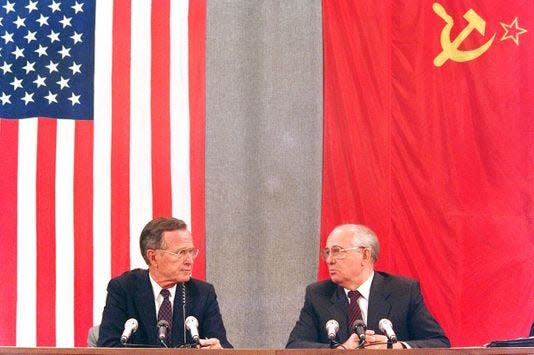Gorbachev left legacy for Russia and the world
- Oops!Something went wrong.Please try again later.
“A riddle, wrapped in an enigma, inside a mystery.”
That is how Winston Churchill, the great wartime leader of Great Britain, described the difficulty of dealing with Russia. He spoke the words in 1939, shortly after the outbreak of World War II in Europe.

The passing of Mikhail Gorbachev on Aug. 30 at 91 provides an incentive to examine not only his legacy and life, but also the nation he led during a time of historic transition. As general secretary of the Communist Party of the Soviet Union from 1985-91, and president of that nation during 1990-91, he spurred fundamental reform efforts.
“Perestroika” and “glasnost” were the twin priorities of the Gorbachev years. The first term referred to restructuring an economy that had become moribund, with nil real production for many years.
The second term referred to efforts to open the society to relatively more freedom for people. The iron fist of Soviet totalitarianism, institutionalized by Joseph Stalin, from 1922 until his death in 1953, also had become the dead hand of secrecy and sloth that dragged down the nation’s economy.
Gorbachev not only drove but also personified change. He was a relatively young 54 when he took control, succeeding the gerontocracy of long-time President Leonid Brezhnev, then the brief tenures of already-old Yuri Andropov and Konstantin Chernenko.
He and his wife, Raisa, were cosmopolitan and sophisticated, open and welcoming. Especially together, they seemed to personify positive changes that generated great optimism at home and abroad.
I had the opportunity to witness their impact very close-up when they visited Chicago in 1992. The Chicago Council on Foreign Relations, where I worked, organized a public lecture that attracted an exceptionally large audience of several thousand.
There was also a reception for business and other leaders from the community. These events were crucial for us. We always balanced our budget and achieved significant long-term growth, despite stagflation.
Events for business executives usually were rather formal, even stuffy. Not this time. Captains of capitalist industry were animated; some of them and their wives seemed almost like kids, anxious to get close, say hi and shake hands with the Russian celebrities.
Raisa and Mikhail were comfortable, friendly and informal. They took everything in stride, seemingly at home among Americans, contrasting with traditional Soviet stiffness and suspicion.
In 1959, Nikita and Nina Khrushchev visited the United States, a first for a Russian or Soviet leader in power. There were some lively moments, especially when the couple visited Hollywood.
Nevertheless, American crowds that lined the routes of the Soviet leader’s motorcades were silent and unsmiling. This was the height of the Cold War, with nuclear Armageddon just one wrong national move away.
Three decades later, Gorbachev fought expansionist foreign policy hardliners while successfully forcing economic reforms. In reaction, in August 1991 there was an attempted coup. Newly elected Russia President Boris Yeltsin successfully orchestrated popular opposition to the coup, but also sidelined Gorbachev.
Gorbachev improved relations with the United States. A summit with President Ronald Reagan led to the Intermediate-Range Nuclear Forces (INF) Treaty. He and President George H.W. Bush successfully reassured Europe as Germany reunited, and achieved the Strategic Arms Reduction (START 1) Treaty.
Mikhail Gorbachev was an extraordinary leader. He and Raisa supported international humanitarian efforts. That dimension could help renew cooperation with today’s Russia.
Churchill emphasized national interest should be paramount in dealing with Russia. That remains good advice.
Email Arthur I. Cyr at acyr@carthage.edu
This article originally appeared on Abilene Reporter-News: Gorbachev left legacy for Russia and the world
